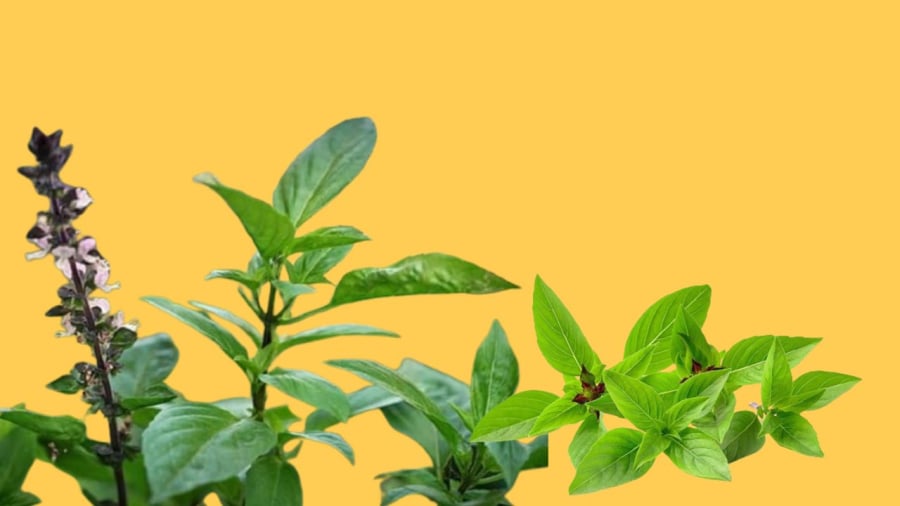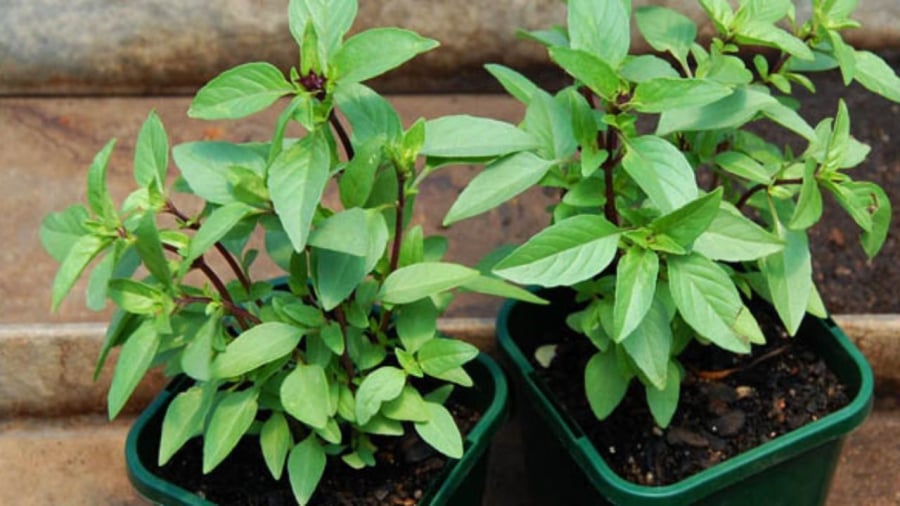Herbs Get an Upgrade and Become Feng Shui Plants
This is basil, a herb commonly used for its aromatic leaves in Vietnamese cuisine and widely sold in local markets. Most grocery stores that sell vegetables carry this herb. Basil has a distinctive aroma and is easy to grow indoors year-round, making it a popular choice for container gardening.
In recent years, basil has gained recognition as a Feng Shui plant due to its ability to purify living spaces with its fragrance. The upward-growing clusters of leaves symbolize attracting wealth and prosperity. In spiritual beliefs, basil is considered a yang plant, bringing good luck and financial abundance to its owners.

Basil Brings Positive Energy
What Does it Mean to Grow Basil Indoors?
Basil is a herb with a rich aromatic oil content and is considered sacred in some cultures. In India, for example, basil is a plant associated with the gods.
In Feng Shui, basil is believed to represent wealth and growth. Its fragrance is thought to ward off negative energies. The scent of basil also helps purify the air, cleansing the home and promoting positive energy. Inhaling the aroma of basil has a relaxing effect, inviting good fortune while dispelling negative influences.
Beyond its culinary uses, basil has multiple benefits, including health improvements, fragrant tea, and insect repellent.

The Many Benefits and Uses of Basil
Best Placement for Basil According to Feng Shui
According to Feng Shui principles, basil should ideally be placed in the north, east, or northeast direction to attract wealth and abundance. Growing basil is straightforward; you can either sow seeds or propagate cuttings. Basil thrives in balconies, windowsills, or kitchen areas with ample sunlight to dispel negative energy and invite positive vibrations, including financial prosperity.
Basil requires minimal care and can be grown in regular potting soil. The key is to avoid harsh sunlight to prevent leaf curling. During the initial propagation phase, maintain moisture and protect the plant from pests like mice and ants. You can water the plant with rice water, but avoid pouring it directly onto the leaves. Excessive direct sunlight will scorch the leaves. When harvesting basil, it is best to do so in the morning or late afternoon, avoiding the midday heat. When you cut the top growth, the plant will respond by producing multiple new branches.
Growing Basil for a Healthier Home
Aside from its culinary uses, basil is also valued for its medicinal properties:
Cancer Prevention: Basil’s essential oil contains compounds that may help inhibit the growth of cancer cells. As a result, basil is believed to be beneficial for cancer patients.
Stress Relief: The unique fragrance of basil has a calming effect on the nervous system and can help alleviate pain. Research conducted in India suggests that basil helps maintain normal levels of cortisol, a stress-inducing hormone. Chewing on a few basil leaves or crushing them to release their essential oils can promote relaxation.
Headache Relief: The essential oils in basil can soothe pain associated with sinusitis, allergies, colds, and migraines. Basil can be consumed as a tea or eaten directly to take advantage of these benefits.
Skin Health: Basil’s detoxifying properties improve blood circulation and promote clearer skin. A basil face wash or spot treatment can be beneficial for acne-prone skin.
Cures Cough: Basil’s antibacterial properties make it an effective remedy for gum inflammation, coughs, and sore throats. Basil’s essential oils, including camphene, eugenol, and cineole, help reduce swelling.
Gum Health and Teeth Whitening: Chewing on basil stems and using the extracted juice as a mouthwash can help reduce gum inflammation and naturally whiten teeth.
Aids Digestion and Relieves Constipation: Chewing on a few basil leaves can provide relief from bloating and constipation.
Insect Repellent: The aroma of basil repels flies, mosquitoes, and cockroaches. Placing a basil plant near windows and in the kitchen can help keep these pests at bay. Crushing basil leaves and rubbing them on the skin is an effective mosquito repellent.
Disclaimer: This information is for reference only and should not be solely relied on for health or medical advice.






























